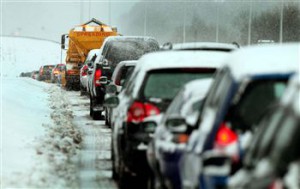
The Scottish Ambulance Service (SAS) has a current target time of eight minutes to reach three-quarters of category A emergency calls.
But in November an ambulance took three-and-a-half hours to reach a category A incident in snow-affected Tayside when a person was recorded as not being alert after falling.
The outcome is not known.
And the slowest response time recorded in the past five years happened on 6 December last year when a patient in Lanarkshire had to wait nine-and-a-half hours for an ambulance to arrive after calling 999 complaining of heart problems.
Fortunately when the Ambulance Service arrived they were no longer needed.
The incident took place when up to 16 inches of snowfall brought Scotland to a standstill.
Overall the SAS reached only 72.7 per cent of category A calls across mainland Scotland within the target time between 7 December 2009 and 6 December last year.
And official statistics from the previous year show that ambulance responses are getting slower, with average response times to 999 calls dropping by 0.3 per cent in the last 12 months.
Labour’s health spokesman, Richard Simpson, said: “This drop in meeting target times would indicate that the Scottish Ambulance Service, like every other service, is having difficulties coping with the winter weather.
“The cabinet secretary will have to look at this in terms of forward resilience for the health service.”
Conservative health spokeswoman, Mary Scanlon, said: “In recent years the Scottish Ambulance Service has been reaching a higher percentage of target response times, so obviously, with these considerations aside, this is very disappointing for their progress towards reaching target times.”
Mary Watt of the Scotland Patients Association (SPA), an independent association organised to support patients in need, said: “I can understand why this has happened because of the horrendous weather conditions we have been having, but any other reasons why target times aren’t met should be looked at, whether the Scottish Ambulance Service is short of staff, short of ambulances, or short of funding.
“Ambulances should be on time because people depend on them. At the end of the day, it is the lives of the patients that are put at risk.”
The news comes as the Scottish Ambulance Service is investing in new vehicles and equipment to enhance its capability and improve patient care in adverse weather conditions.
Eight new 4X4 accident and emergency vehicles have been delivered with two more to follow by the end of the month.
The vehicles will be based across all divisions of the Scottish Ambulance Service.
The SAS also took delivery of 12 patient transport service 4X4 vehicles in December.
Health Secretary Nicola Sturgeon said: “I am delighted that the Scottish Ambulance Service is to further enhance the resilience of its emergency service with the delivery of a fleet of new vehicles that can be used during extreme winter weather of the sort that we experienced recently.
“Ambulance crews work hard to provide the best patient care at all times but these new vehicles will assist staff experiencing difficult driving conditions and challenging terrain.”
Chief executive of the Scottish Ambulance Service Pauline Howie said: “These new vehicles will further enhance the capability of our existing 4X4 fleet to cope with severe weather and difficult terrain.
“Our staff worked tirelessly through horrendous conditions this year, keeping the 999 service running as well as transport to regular hospital treatment for renal, oncology and cardiac cases, often putting the wellbeing of patients before their own.
“We continuously review contingency arrangements for response to major incidents and extreme situations.”
The service is also investing in snow tyres and chains for a further 52 vehicles.
